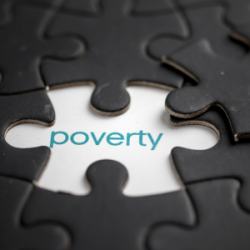Welcome readers! Please subscribe through the buttons at the right if you enjoy this post.

In both Matthew’s and Luke’s gospels we read similar “woes” from Jesus in toward apathy or passive responses to his calls for distributive justice: “Woe to you, Chorazin! Woe to you, Bethsaida! For if the miracles that were performed in you had been performed in Tyre and Sidon, they would have repented long ago in sackcloth and ashes. But I tell you, it will be more bearable for Tyre and Sidon on the day of judgment than for you. And you, Capernaum, will you be lifted to the heavens? No, you will go down to Hades. For if the miracles that were performed in you had been performed in Sodom, it would have remained to this day. But I tell you that it will be more bearable for Sodom on the day of judgment than for you.” (Matthew 11:21-24 cf. Luke 10:13-15)
First the week let’s discuss a little first-century geography for our story:
Chorazin, was a middle-sized city in upper Galilee.
Bethsaida, to the best of our knowledge, was a fishing polis near the mouth of the Jordan river on the northern side of the sea of Galilee.
Tyre, a Gentile, maritime-merchant, Phoenician city, was captured by Alexander the Great in 332 BCE, and then by the Greek Seleucids from 316 to 125 BCE. The Roman Empire conquered it in 64 BCE.
Sidon was an ancient, Gentile, Phoenician city with a long history of being conquered repeatedly by Assyrians, Babylonians, Egyptians, Persians, Greeks, and Romans. It also belonged the often negative ancient Hebrew narrative of being “other.” Originally, it was assigned to Asher, but was never subdued (Judges 1:31). The Sidonians long oppressed Israel (Judges 10:12). By the time of David’s narrative, Sidon began to wane, and Tyre, its “virgin daughter” (Isaiah 23:12), rose to eminence. Solomon entered into a matrimonial alliance with the Sidonians, which became the accused source of “idolatrous worship” in the land of Israel (1 Kings 11:1, 33). Jezebel was also a Sidonian princess (1 Kings 16:31).
Capernaum, another fishing village on the north shore of the sea of Galilee, was a base for Jesus’ ministry in the Gospels.
James Robinson in his volume The Gospel of Jesus explains how all of these towns relate:
“Jesus developed on the north shore a small circuit of three villages, Capernaum, Bethsaida, and Chorazin. These towns may also have been helpful. His base camp at Capernaum was still in Galilee, ruled by Herod Antipas, who had put John to death. But [Capernaum] was a border town, and Jesus befriended the Roman centurion stationed nearby. It was on the frontier of the territory of Philip, a less threatening ruler. Bethsaida, across the frontier just outside Galilee, was in fact the capital of Philip’s territory, so it may well have been politically safer. It was also the hometown of one of John’s converts who became Jesus’ first disciple, Andrew.” (Kindle Location 2550)
Passivity, Apathy, Hades & Sodom
The “woes” we encounter in this week’s saying are addressed to the primary towns Jesus conducted his ministry in. His teachings about nonviolent enemy transformation, peasant mutual-aid, community interdependence, resource sharing, and voluntary wealth redistribution from the rich, I can imagine, must have been about as popular back then as they are today.
The Hebrew prophets that had come before Jesus had also pronounced woes that announced or warned of impending destruction on societies whose injustice and oppression were reaching a critical breaking point. Our societies can learn from the path that many followed in Palestine and the Roman destruction that came as an intrinsic result forty years later. Violence used to solve the world’s problems, isolationism, independence and individualism, and growing global and national wealth disparities are all warnings to those today who have eyes to see that the path we are on cannot continue indefinitely. It’s not sustainable politically, socially, economically, or environmentally.
Just as Capernaum did, a society may consider its wealth a sign of being “God blessed” and “heaven” bound, all while their riches are the fruit of exploitation and they’re bound for hell or “hades.” Jesus, here, is using Hebrew prophetic liberation imagery found in Isaiah 14:
“On the day the LORD gives you relief from your suffering and turmoil and from the harsh labor forced on you, you will take up this taunt against the king of Babylon:
How the oppressor has come to an end!
How his fury has ended!
The LORD has broken the rod of the wicked,
the scepter of the rulers,
which in anger struck down peoples
with unceasing blows,
and in fury subdued nations
with relentless aggression.
All the lands are at rest and at peace;
they break into singing.
Even the junipers and the cedars of Lebanon
gloat over you and say,
‘Now that you have been laid low,
no one comes to cut us down.’
The realm of the dead below is all astir
to meet you at your coming;
it rouses the spirits of the departed to greet you—
all those who were leaders in the world;
it makes them rise from their thrones—
all those who were kings over the nations.
They will all respond,
they will say to you,
‘You also have become weak, as we are;
you have become like us.’
All your pomp has been brought down to the grave,
along with the noise of your harps;
maggots are spread out beneath you
and worms cover you.
How you have fallen from heaven,
morning star, son of the dawn!
You have been cast down to the earth,
you who once laid low the nations!
You said in your heart,
‘I will ascend to the heavens;
I will raise my throne
above the stars of God;
I will sit enthroned on the mount of assembly,
on the utmost heights of Mount Zaphon.
I will ascend above the tops of the clouds;
I will make myself like the Most High.’
But you are brought down to the realm of the dead,
to the depths of the pit.” (Isaiah 14:3-15, emphasis added.)
The fact that Hades is mentioned at all in Matthew’s gospel is evidence to many scholars that this is a Galilean saying. Galilee was more influenced by their Hellenistic neighbors than the Jewish community south of them in Judea. Hades was a Hellenistic term, not an originally Jewish one.
Within the Hellenistic worldview, Hades was synonymous with death, and the dualism of a post mortem Heaven and Hell are late arrivals to the Jewish people of the first century. Many Jewish people subscribed instead to an apocalyptic world view.
In regards to Sodom, as we discussed at length in Responding to Rejection, Sodom’s story wasn’t finished yet. Sodom was envisioned by Ezekiel as being fully restored. As stigmatic as the narrative surrounding Sodom and its economic individualism was (its independent isolationist rejection of mutual aid and basic hospitality to visitors as well as immigrants); the day of judgment coming at the end of the apocalyptic age would be more bearable for it than for the Galilean communities if they continued choose (economically, religiously, and politically) to remain on the path they were presently on.
Day of Judgement
Jewish apocalypticism looked forward to a day of judgment when all oppression, violence and injustice in the world would be put right. Early Jewish followers of Jesus believed that his emergence in the Jewish community was the apocalyptic event they were looking forward to. There was much more to this view, of course, but the “day of judgment” was central.
The Day of Judgment was a day of great reversal regarding power and resources. On this day of things being put right, those in dominant positions of exploitative and oppressive power would receive their due, and those who had been oppressed and subjugated would be liberated. The Pharisees of the school of Shammai shared this view, except that their definition of the oppressed and subjugated who would be liberated and rewarded would have focused on those oppressed people who also faithfully practiced the School of Shammai’s interpretation of the Torah. Jesus enlarged his definition of those who were oppressed and soon to be liberated to include the poor, the marginalized, people labeled as “sinners” by the followers of Shammai, and even the tax collectors. Jesus’s group of oppressed and subjugated was much larger than the religious boundaries in place in his day.
Jesus taught the people that the day of things being made right was coming, and that they had to choose the way of putting things right. Remember, Jesus’ subversive “empire” of God was defined as people taking care of people. According to Jesus, those early followers were the ones through whom God would begin to put things right. Their choices and participation were essential.
Present Path
I do not believe that we here in America can continue indefinitely on our present path: we are approaching a breaking point in our history. However, I do believe that Jesus’ two thousand-year-old Jewish sayings are intrinsically valuable and are relevant to our challenges today. The path of nonviolence; the path of resource sharing, voluntary wealth redistribution, mutual aid; the power of interdependent communities, these teachings of Jesus represent rich alternative ways of doing life that offer us a different path for us. Jesus teaches us that power and resources are to be mutually shared, not wielded. Fear of the future and one another and fear of those who are unlike ourselves can be replaced by mutual love and caring. Greed, racism, hierarchies, and a myriad of phobias toward others don’t have to be our driving societal forces.
For us, if we don’t choose an alternate path as a society, then not too far in the future, the saying Jesus shares in our passage this week could be said of us as well. The woes he once uttered toward communities who chose to remain on their path until it was too late could also apply to us. In his historical context, it was not until after the people’s bright hopes for the future were devastatingly decimated that they chose alternatives. But change doesn’t have to come through such violent upheaval. It could start today. Here. Now. With you and with me, if we will choose it. The path of distributive justice that Jesus laid out still calls to us, “Follow me.” Like those who heard these sayings long ago, we are also at a cross roads.













